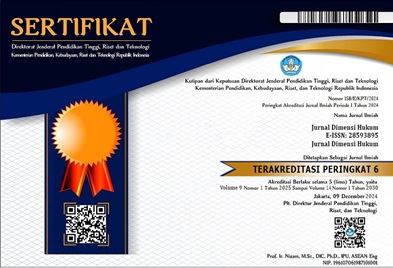PROBLEMATIKA PENERAPAN HUKUMAN TAMBAHAN KEBIRI KIMIA BAGI PELAKU TINDAK PIDANA KEKERASAN SEKSUAL TERHADAP ANAK DI INDONESIA
Kata Kunci:
Kekerasan Seksual, Anak, Dan Kebiri KimiaAbstrak
Kekerasan seksual merupakan kejahatan yang perlu mendapatkan perhatian lebih, baik dari pemerintah maupun masyarakat terlebih jika korbannya adalah anak. Menindaklanjuti maraknya kasus kekerasan seksual terhadap anak yang semakin meningkat dari waktu kewaktu, mendorong pemerintah untuk memperberat hukuman bagi pelaku tindak pidana kekerasan seksual terhadap anak dengan memberlakukan pidana tambahan yaitu kebiri kimia. Hukuman kebiri kimia menimbulkan problematika dalam pelaksanaanya. Maka dari itu penelitian ini bertujuan untuk mengetahui problematika penerapan hukuman tambahan kebiri kimia terhadap pelaku tindak pidana kekerasan seksual pada saat ini di Indonesia serta Untuk merumuskan upaya penanganan pelaku tindak pidana kekerasan seksual pada masa yang akan datang. Penelitian ini termasuk dalam kategori jenis penelitian/pendekatan hukum yuridis normatif, yaitu penelitian yang difokusnya untuk mengkaji taraf singkronisasi hukum. Dalam pengumpulan data untuk penelitian hukum normatif digunakan metode kajian kepustakaan yang meliputi studi dengan mengkaji, menelaah dan menganalisis informasi yang diperoleh dari berbagai literatur seperti buku-buku, perundang-undangan, karya ilmiah, internet dan sumber-sumber lainnya. Kesimpulan dari penelitian ini adalah bahwa problematika penerapan hukuman tambahan kebiri kimia bagi pelaku tindak pidana kekerasan seksual terhadap anak di Indonesia adalah pertama, penolakan Ikatan Dokter Indonesia sebagai eksekutor kebiri kimia karena bertentangan dengan Kode Etik Kedokteran dan Sumpah Dokter. Kedua, tujuan dari adanya hukuman kebiri kimia ini belum dapat tercapai dengan baik, diperkuat dengan maraknya angka kasus kekerasan seksual terhadap anak yang tidak meredam meskipun Undang-Undang Perlindungan Anak yang mengatur terkait dengan hukuman kebiri kimia telah diterapkan. Adapun saran penulis yaitu pertama, pemerintah dapat mengadakan kesepakatan dengan Majelis Kode Etik Kedokteran untuk memberikan kepastian hukum kepada dokter sehingga dokter dapat mengeksekusi pelaku kekerasan seksual terhadap anak karena merupakan perintah hukum namun tetap tidak melanggar kode etik dan sumpah dokter. Kedua, penulis menyarankan pemberlakuan Circles of Support and Accountability di Indonesia sebagai upaya untuk menangani pelaku kekerasan seksual terhadap anak.
Sexual violence is a crime that needs more attention, both from the government and society, especially if the victim is a child. Following up on the increasing number of cases of sexual violence against children which has increased over time, has encouraged the government to increase the punishment for perpetrators of sexual violence against children by imposing additional punishment, namely chemical castration. Chemical castration punishment causes problems in its implementation. Therefore, this study aims to determine the problems of implementing additional chemical castration punishment for perpetrators of sexual violence in Indonesia today and to formulate efforts to handle perpetrators of sexual violence in the future. This research is included in the category of normative legal research/approach, namely research that focuses on examining the level of legal synchronization. In collecting data for normative legal research, a literature review method is used which includes studies by reviewing, examining and analyzing information obtained from various literature such as books, legislation, scientific works, the internet and other sources. The conclusion of this study is that the problematic implementation of additional punishment of chemical castration for perpetrators of sexual violence against children in Indonesia is first, the rejection of the Indonesian Doctors Association as the executor of chemical castration because it is contrary to the Code of Medical Ethics and the Doctor's Oath. Second, the deterrent purpose of the chemical castration punishment has not been achieved properly, reinforced by the increasing number of cases of sexual violence against children which have not decreased even though the Child Protection Law which regulates chemical castration punishment has been implemented. The author's suggestions are first, the government can make an agreement with the Medical Code of Ethics Council to provide legal certainty to doctors so that doctors can execute perpetrators of sexual violence against children because it is a legal order but still does not violate the code of ethics and the doctor's oath. Second, the author suggests the implementation of Circles of Support and Accountability in Indonesia as an effort to deal with perpetrators of sexual violence against children.





